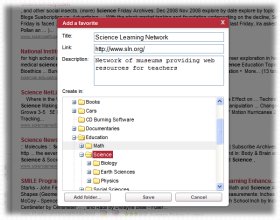|
Education
Web
Viewing 1-3 of 3 total results
8 Standard 1: Nature and Application of Science and Technology, Grade Level Expectations Grades K-3 Essential Questions: What makes a question scientific? What constitutes evidence? When do you know you have enough evidence? Why is it necessary to justify and communicate an explanation? Ess...
1
0
8 Standard 1: Nature and Application of Science and Technology, Grade Level Expectations Grades K-3 Essential Questions: What makes a question scientific? What constitutes evidence? When do you know you have enough evidence? Why is it necessary to justify and communicate an explanation? Essential Question: How do science and technology influence each other? Essential Questions: How have past scientific contributions influenced current scientific understanding of the world? What do we mean in
8
0
http://www.doe.k12.de.us/infosuites/staff/ci/content_areas/files/science/science_Standard1.pdf#page=8
www.doe.k12.de.us/infosuites/staff/ci/content_areas/files/science/science...
8 Standard 1: Nature and Application <span class="highlight">of</span> Science and Technology, Grade Level Expectations Grades K-3 Essential Questions: What makes a question scientific? What constitutes evidence? When do you know you have enough evidence? Why is it necessary to justify and communicate an explanation? Essential Question: How do science and technology influence each other? Essential Questions: How have past scientific contributions influenced <span class="highlight">current</span> scientific understanding <span class="highlight">of</span> the world? What do we mean <span class="highlight">in</span>
HISTORY History organizes events and phenomena in terms of when they occur. Students study the ways in which individuals and societies have changed and interacted over time. They practice the skills of gathering historical data, and examining, analyzing, and interpreting...
1
0
HISTORY History organizes events and phenomena in terms of when they occur. Students study the ways in which individuals and societies have changed and interacted over time. They practice the skills of gathering historical data, and examining, analyzing, and interpreting these data. They learn to organize events through chronologies, and to suggest and evaluate cause-and-effect relationships among those events. Before choosing a position or acting, citizens need to be able to research issues in order
5
0
http://www.doe.k12.de.us/infosuites/staff/ci/DRC/pcs_History.pdf#page=5
www.doe.k12.de.us/infosuites/staff/ci/DRC/pcs_History.pdf#page=5
HISTORY History organizes events and phenomena <span class="highlight">in</span> terms <span class="highlight">of</span> when they occur. Students study the ways <span class="highlight">in</span> which individuals and societies have changed and interacted over time. They practice the skills <span class="highlight">of</span> gathering historical data, and examining, analyzing, and interpreting these data. They learn to organize events through chronologies, and to suggest and evaluate cause-and-effect relationships among those events. Before choosing a position or acting, citizens need to be able to research issues <span class="highlight">in</span> order
9 Standard 3: Energy and Its Effects, Grade Level Expectations Grades K-3 Essential Question: How do we know that things have energy? Essential Question: How can energy be transferred from one material to another? What happens to a material when energy is transferred to it? Essential Questions: Wha...
1
0
9 Standard 3: Energy and Its Effects, Grade Level Expectations Grades K-3 Essential Question: How do we know that things have energy? Essential Question: How can energy be transferred from one material to another? What happens to a material when energy is transferred to it? Essential Questions: What happens to the energy in a system — where does this energy come from, how is it changed within the system, and where does it ultimately go? How does the flow of energy affect the materials in the
9
0
http://www.doe.k12.de.us/infosuites/staff/ci/content_areas/files/science/science_Standard3.pdf#page=9
www.doe.k12.de.us/infosuites/staff/ci/content_areas/files/science/science...
9 Standard 3: Energy and Its Effects, Grade Level Expectations Grades K-3 Essential Question: How do we know that things have energy? Essential Question: How can energy be transferred from one material to another? What happens to a material when energy is transferred to it? Essential Questions: What happens to the energy <span class="highlight">in</span> a system — where does this energy come from, how is it changed within the system, and where does it ultimately go? How does the flow <span class="highlight">of</span> energy affect the materials <span class="highlight">in</span> the
|
